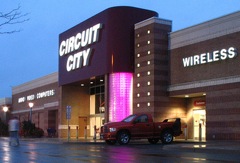
There’s something almost laughable about shopping for digital cameras or television sets at typical big-box stores such as Target, Circuit City or Best Buy. You are usually greeted by row after row of devices, with very little explanation of how they are different — perhaps with a few bullet points on a tag.
And good luck getting someone to help you out. The people who work in these stores are usually overworked, underpaid and know very little about what you’d like to know. By the time you do get their attention, they are only interested in selling you the most expensive gadget and then selling you every possible accessory and support plan ever invented.
The definition of “customer service” is stretched beyond the imagination at most of these mega-stores, as you rarely feel like you’re getting service and you feel much more like an annoyance than a paying customer. No wonder the movie “The 40 Year Old Virgin” had such an easy target in making fun of electronics stores.
And it’s hard to pity the travails of Circuit City, which has lost hundreds of millions of dollars over the past couple years and is trying to remake its image with smaller stores called “The City.” These more boutique-type stores feature less products and more installation and support packages. According to the AP, the move “reveals the company’s recognition that the smaller electronics of the future will need less selling space, especially as online content replaces DVDs, CDs and video games sold in stores.”
So that got me thinking about the future of these electronics stores, as CompUSA has disappeared and so much can be researched and bought online. Just as I did last year with the disappearance of video stores, I’ve tallied up the pluses and minuses of a world without physical brick-and-mortar electronics stores.
What We Gain Without Electronics Stores
> Less time wasted in stores, in lines or waiting for help.
> We can get more direct research material on what we need by going online to compare products, read reviews and buy — often within a few mouse clicks.
> The convenience of shopping around online, jumping from store to store without having to drive all over town to find a particularly popular videogame system or new mobile phone.
> Buyer recommendations. On sites such as Amazon and CNET, you can see what other people thought about gadgets before you buy them, which is often an early warning sign for lemons or glitchy items.
> More inventory. When you shop online for electronics, you have more choices because you can buy from other countries, buy from smaller stores and even get good deals on auction sites such as eBay. Not to mention the used-goods bonanza that is Craigslist.
What We Lose Without Electronics Stores
> The ability to feel or touch the product we want to buy. This is the key advantage of in-store merchandise: We can see it and try it out before buying.
> Instant gratification. OK, maybe “instant” is too strong of a word with the poor state of customer service, but you are more likely to walk out of the store with what you want rather than buying something online and having to wait for delivery on a future date.
> Similarly, we can return the gadget by stopping by the store and don’t have to mail it back. However, with online sites for brick-and-mortar stores, we often do have the option of making online returns in person at a store.
> Cheaper demo or floor models.
> More detailed installation and hands-on support, however many e-commerce sites do offer competitive support options.
Of course, many people operate with a kind of hybrid online/offline shopping experience, going online for research and then going to a store to buy what they want. And that’s where I suspect this will all go, toward an Apple store model, with stores operating as boutiques and support centers while most purchases are made online.
What do you think? Have you given up on electronics stores or do you still value going in to try out gadgets in person before buying them? How do you think electronics stores should evolve? Share your thoughts in the comments below.
Photo of Circuit City store by pirate johnny via Flickr.

I think a lot of the problems are more to do with the structure of the businesses mentioned. Over in the UK we have a box shifter called Richer Sounds which manages to combine a decent price and customer service.
I surf online to have a look at their stock and then go instore to buy.
Maybe we don’t need a grand theory of brick-and-mortar to explain why Circuit City’s in so much trouble. Maybe if they hadn’t fired 3400 of their highest-paid salespeople and replaced them with less experienced minimum wage hacks, they would be doing better right now.
They had one bad quarter, so they freaked out and fired anyone who made it worth stepping inside the store.
apple store, totally!